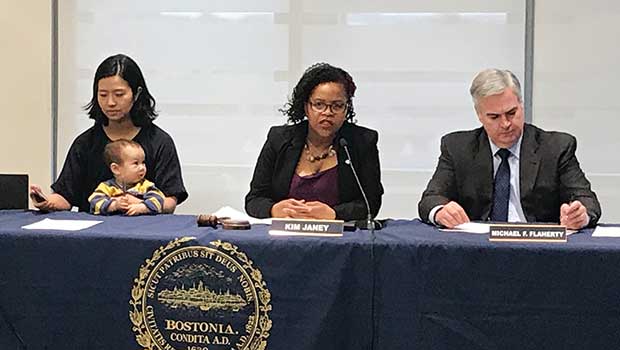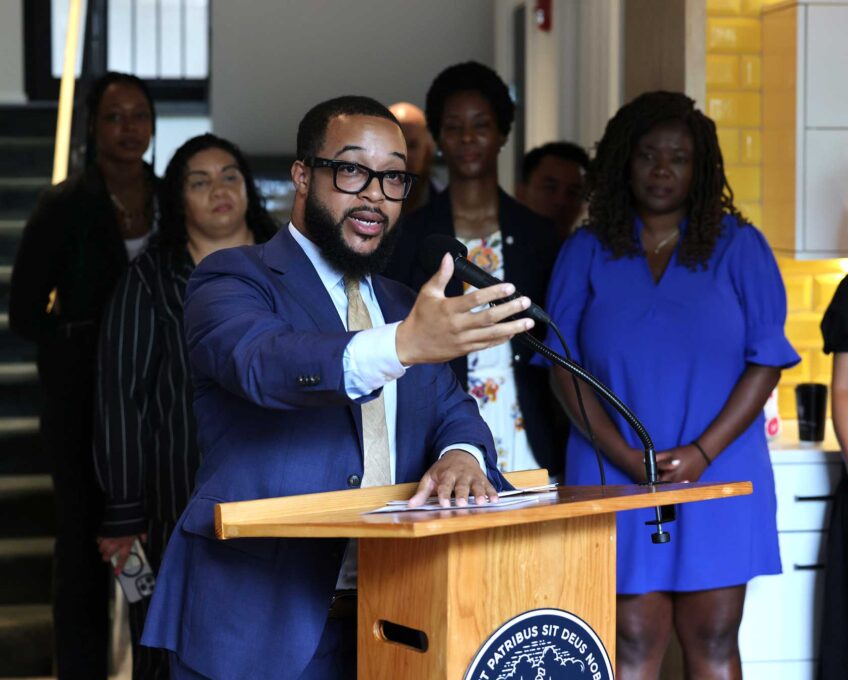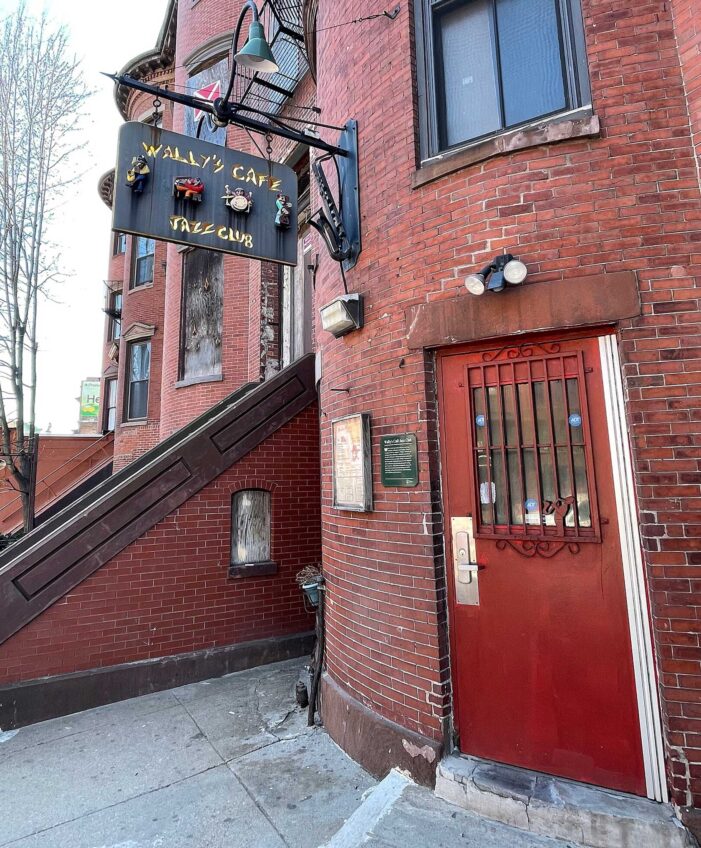Supporting small business
Boston entrepreneurs talk challenges and ideas at hearing

The Boston City Council Committee on Small Business and Consumer Affairs held a hearing last Tuesday at the Bruce C. Bolling Building on the opportunities and challenges facing small businesses such as access to capital, equitable liquor license distribution and navigating the permitting process.
Several local entrepreneurs and community leaders testified in front of councilors Michelle Wu, Michael Flaherty, Lydia Edwards and the committee’s chair Kim Janey.

Photo: Courtesy of the Office of City Councilor Kim Janey
The first panel of community members to testify included Sheryce Hearns, deputy director of the city’s Office of Economic Development; Stephen Gilman, program director for Boston Main Streets; and William “Buddy” Christopher, commissioner of Inspectional Services Department.
Through conversations with local business owners, Janey said she learned the city’s permitting process was a major challenge for them. She asked Christopher how the city could streamline the process.
Christopher said in addition to offering multilingual services, the ISD has changed from “being a business of saying ‘no’” to a department that works with businesses directly in guiding them in the right direction.
“Our commitment is that when you come into ISD, you leave with one of two things. Either the permit proceeds or you leave with an understanding of what you need to do to get to that point,” he said.
Flaherty commented that to address the bureaucratic red tape that new business owners face in getting permits from various departments, “new businesses should get a checklist to get all their permits together, and it’s on us to make sure everything gets checked off in a timely manner. If not, their fees are refunded.”
Wu agreed.
“I’m going to keep pushing for an RMV-like approach [to permitting],” she said. “I know we need to get faster at responding,” she said. “The first step is giving applicants average turnaround times for each permit.”
Parking spaces
The discussion then turned to high costs for renting brick-and-mortar business spaces. Joyce Stanley, executive director of Dudley Main Streets, said that when Joanne Chang first started her chain-bakery business, Flour Bakery, she received subsidies and loans from the city through a program called the Empowerment Zone.
Stanley said that other local businesses who received Empowerment Zone help are still paying the city back.
“What happened to that money? Could it be put back in small businesses?” said Stanley. “The BRA [BPDA] is in control of that money and no one has been able to tell us where the money is and some are still paying that money back.”
According to Gilman, another major hurdle business owners are facing is the lack of foot traffic to their stores or restaurants. Stanley said that in Dudley Square, insufficient foot traffic might stem from a lack of parking spaces in the area.
According to Stanley, the vacancy rate in Dudley was 3 percent in the early 2000s, and now it’s at 9 percent.
“With all the new construction of buildings that happened all at once, with the Bolling Building and the police station, we started losing long-term businesses because there isn’t any parking for customers,” she said, naming Nubian Notion as one of those now-closed businesses.
Wealth gap
The second panel to testify included Malia Lazu, founder of Epicenter Community Inc., and Accelerate Boston; Glynn Lloyd, executive director of the Business Equity Initiative at Eastern Bank and Ed Gaskin, executive director of Grove Hall Main Streets.
Lazu said that in graduating over 100 minority businesses through the Accelerate Boston program, she has identified several challenges entrepreneurs face today.
She said those challenges include the lack of encouragement within minority communities to pursue entrepreneurship and other risky ventures, a networking gap and a capital gap.
“Wealth begets wealth,” said Lazu.
Liquor licenses
Lloyd presented the council with initiatives that Eastern Bank is currently engaging in to invest in black and Latino-owned businesses including investing philanthropic dollars into subsidizing infrastructure costs for new businesses, as well as providing personal advisors to those businesses to grow their networks.
Lloyd also said Eastern Bank is partnering with The Boston Foundation to house the Business Equity Fund.
“It’s new on the scene and we’re approaching it differently,” he said. “We made sure the decision-making roles for the fund are folks of color.”
Gaskin proposed creating a master list of all the services offered by the city, department by department, so that entrepreneurs and business owners can be informed and take advantage of them.
Priya Lane, the economic justice project director for the Lawyers’ Committee for Civil Rights and Economic Justice, also offered testimony from her experience in providing free legal assistance to minority business owners.
She said the cost for a company to become an LLC is a major barrier in Massachusetts at $500 a year, despite all other 49 states in the country only charging around $200.
“This disproportionately affects small businesses,” said Lane.
In addition, the cost of liquor licenses prevent restaurant owners from expanding their business. “There is an enormous economic advantage to offering liquor, being able to have business later in the day,” she said.
The hearing’s final panel included Cheryl Straughter, owner of Keith’s Place restaurant; Luther Pinckney, manager of now-closed Dudley Dough; and Haris Hardaway, co-owner of Final Touch boutique.
Straughter said as a local restaurateur who plans to open another restaurant in the former Tasty Burger space in the Bolling Building, she would like the city to address loitering in the area.
“Whether it’s addiction-related, mental-health related, we have to address the collection of folks in and around Dudley,” she said. “As a business owner, that’s a visual I would like to see addressed relatively soon.”
Hardaway proposed more micro-investment initiatives that would include residents in Boston who want to invest in local businesses but instead of $10,000, they usually only have a couple thousand dollars.
“We can create a solution to bring those neighborhood people together,” he said adding that if ten community members each have around $2,500, they could collectively invest in a restaurant or a startup.
In a later phone conversation with the Banner, Janey reflected on the various testimonies she heard at the hearing.
“We not only heard challenges, but also concrete solutions and ideas. I’m excited to do follow-up with the folks who attended,” she said.






